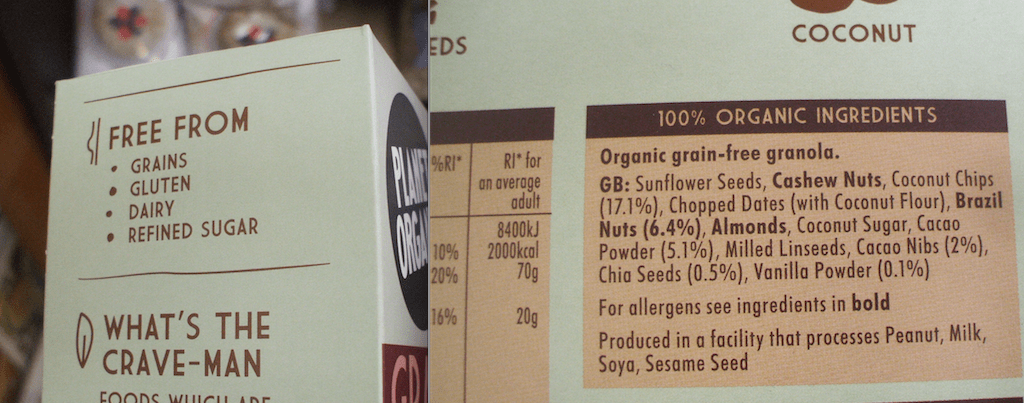I’ve written a lot in the past about the terms ‘dairy’ and ‘vegan’ and how they apply to ‘free from’, as well as how they impact those who avoid milk for various reasons — veganism, milk allergy / CMPA, lactose intolerance.
The issues are complex. Why? Well, part of the reason is that the definitions involved are not agreed-upon:
Vegan
The Vegan Society’s definition for vegan food differs to that of the Food Standards Agency (presently under review by DEFRA). Simplified, the former take it to mean ‘no animal-sourced ingredients’; the latter, ‘no traces of animal ingredients’. In other words, the FSA have said that food labelled vegan should effectively be safe for those allergic to milk, fish and eggs, but the Vegan Society say that products carrying their logo may not be.
Free From Food
Is free from food which carries some form of ‘free from’ labelling? Is it food manufactured to be free from an ingredient that would ordinarily be present in a ‘non free from’ equivalent? Does that ingredient necessarily have to be one of the 14 allergens — or can sugar free or corn free or additive free food be considered ‘free from food’? Is ‘vegan food’ — vegan according to the Vegan Society definition — always ‘free from food’?
Free from ‘x’ / ‘x’-free
Does this mean ‘free from all traces of x’, as far as is measurable, or ‘no x-containing ingredients’? Does it depend on whether or not x is an allergen? Gluten free has been redefined to mean 20 parts per million or under, and sulphite free 10 parts per million or under, but no such thresholds have been set for other allergens.
So … dairy-free vs milk-free
I’ve suggested before that the term ‘dairy free’ should perhaps be abandoned because ‘dairy’ is not an allergen — ‘milk’ is.
The term ‘dairy free’ may mean different things to different people.
We can’t say the same about ‘milk free’. We know what milk is — it’s any mammalian milk, and it’s a top 14 allergen. In the absence of any threshold, ‘milk free’ should be taken to mean ‘zero milk’. But: in the absence of laboratory testing which can demonstrate ‘zero’ milk — we have to take the nearest equivalent, which is ‘no detectable milk’. That is what milk free legally means.
So I’ve now come around to thinking that dairy free should not be considered, used or promoted as an allergen message. It’s a lifestyle or ethical message. To me it means ‘no dairy/milk-derived ingredients’. In a previous article I argued that vegan isn’t always ‘dairy free’. But I’ve changed my view. It is always ‘dairy free’. It’s just that dairy free isn’t always milk free — whichever interpretation of vegan we settle on.
‘Dairy free’ plus milk PAL
So where does this leave products claiming to be ‘dairy free’ and carrying a milk-related precautionary allergen label?
Here’s a Planet Organic Granola, with ‘free from dairy’ plus a milk PAL.

Here’s a Coconut Collaborative product, which is ‘non-dairy’ and a dairy warning (problems with gluten claims too, incidentally):

There are others, including Miiro, who make the much-praised Magnum-style dairy free choc-ices.
Is this misleading — or acceptable? And how do we resolve this issue — if indeed it is an issue that needs resolving? Answers on a postcard, please ….
Further Reading
Allergy Insight — Gluten and dairy are not allergens
Foods Matter — Why ‘vegan’ may not always mean ‘milk free’
Food Allergy Research and Resource Program (US) — Dairy-Free and Non-Dairy?
The Vegan Society — The difference between animal-free and ‘free from’
Hmm! I don’t think there’s a one-size fits all thing either way we look at it. I prefer ‘dairy free’ because it encompasses butter, cheese, yogurt etc. What I dislike about ‘milk free’ is that people often forget about the products that are made with milk. So, for example, my cousin made crumble the other day – gluten free for me and my uncle, but unfortunately not suitable, because it was made with butter and it simply hadn’t occurred to her that it was made with milk. And this is coming from someone who bakes regularly & often for all kinds of occasions, not professionally, but a keen amateur. However, one way or another, I am desperate for a legal ruling to protect the safety of milk allergic consumers & much, much, much more information out there in wider society, but particularly among those who cater for others or who manufacture foods. It’s our lives/health in their hands.
That is one of the unfortunate consequences of the dairy / milk confusion – and I guess the best argument against what I’m proposing. But I think there could be a distinction made on food labelling. ‘People’ may often forget that butter, yogurt, cream etc are milk, but food manufacturers should not and are legally obliged to remember! I doubt we’d ever entirely reach a situation where a milk allergic person no longer has to specify ‘dairy and milk free’ in a restaurant, but some sort of standardisation in food labelling would be a huge step forward in order to, as you say, protect the safety of milk allergic consumers